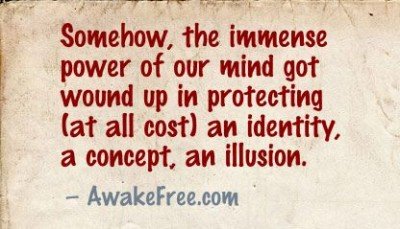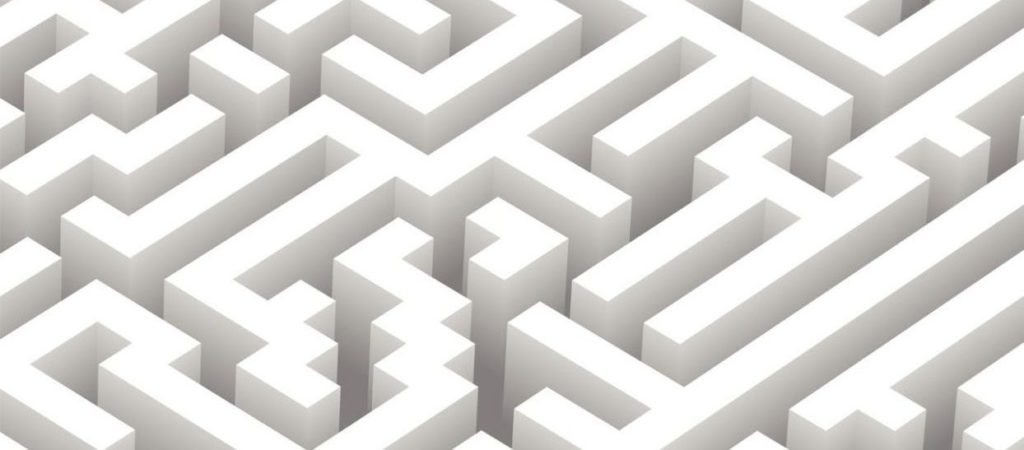Share:
The human mind has immense power. We should not shy away from our capabilities – to create massive buildings, detailed mathematics, languages, systems, and civilizations, to explore uncharted regions. Yet many attest that we only use a tiny percentage of the mind’s capabilities, much of it’s power masked under the sub-conscious. Still, our power is there (used everyday) to create wittingly or unwittingly, to evolve or devolve, for control, or in freedom.
 Somehow, this immense power got wound up in protecting (at all cost) an identity, a concept, an illusion. Our identity being an inherited thought, that ‘I am something’ …’I am this… which is different from that, from you, the rest of the world, and even God.’
Somehow, this immense power got wound up in protecting (at all cost) an identity, a concept, an illusion. Our identity being an inherited thought, that ‘I am something’ …’I am this… which is different from that, from you, the rest of the world, and even God.’
Protecting this concept of separateness is the root of madness and neurotic actions on personal levels as well as a global level. The power is the same, whether it is you and I, protecting an image of ourselves from critique, or multiplied to hundreds of thousands, protecting a religious or national identity from all that is different. Our leaders are people with identities to protect, just like you and I.
Conditioned to believe ‘I am this, or I am that,’ we act and react automatically, in a slumber, unaware of why we do what we do.
Now here is a subtle but important point which we can explore more later. Even if one is on a path to freedom, trying to break away from an inherited religion, nation, or ideology, the mind which seeks security by having to know, ‘What am I?’, quickly adopts new concepts, new styles, new ideologies. Free from one set of conditioning, it quickly formulates a new condition. But no matter the style, ideology, or concepts – a condition, is still a condition, a different ideology still endorses a difference, and therefore still limits the mind which could do so much more in freedom.
Before we get into all that, here is Sardar Singh speaking about the fundamental root of our conditioned identity…
Join us on this journey to break free from social conditioning to live more authentically…


I see what you mean. The way I always thought of this is…the mind is a pattern recognition machine. My goal in the conscious state of mind is to remain as open as possible. But for me, I think *some* model has to be formed to make sense of data in the conscious state. An analogy would be if I tried to understand this paragraph by completely forgetting the English language. Patterns (constructs, conditioning, etc.) can be helpful, and they allow humans to interact, share thoughts, etc. My goal is to simply have a very large mental model to apply to what I see and experience. And expand it as necessary.
I also think the mind works differently when in a different state of consciousness (e.g. the state entered via meditation for example or in the dream state or any number of other avenues). Those can be places of a non-judging, non-comparing mind…a place populated with fewer mental models — a place more open to pure experience. A place of “just existing” or “just being” as opposed to thinking, judging, etc.
By the way, thanks for causing me to think through this topic today. As you said, your posts may be a way to examine our own views.
You make an excellent point Curt. We need mental constructs to communicate, create, and really even to see and navigate (we can get into that more later).
At this point it would be good to examine the distinction between useful constructs which allow us to function, to create; and personal attachment to ideals.
The best way I can describe this is… thought and thinking, in and of itself are neutral. In this sense it is quite useful. I’ve learned how to add, design, draft, communicate, and create. I am constantly learning new things to add to my repertoire, new languages, skills, techniques by which to communicate and create. Here I am free to learn, create, grow, and evolve.
The moment I become attached to ideas and say ‘I am this’ or ‘I know this is the only way’ is where the power of our free mind becomes locked up.
Now, it doesn’t really require meditation to recognize this or live this. It is really a matter of clearly seeing where our mind can become attached to concepts. When we are psychologically free, we can use our knowledge to move through the constructs in which we operate, without getting lost in them, or identified with them. Without the unnecessary attachment, we operate intelligently and powerfully.
It would be interesting to find out how much of our mind-power is wasted on protecting our identity, instead of actually solving problems and creating.
This reminds me of Fromm how people will give up there mind and free will to obey authority even when its wrong. Also how people will ignore themselves to be accepted in a group. this page is cool
Lotalrio, thanks for the good words. So true, ´How people ignore themselves to be accepted in a group.´ Look forward to keeping up.